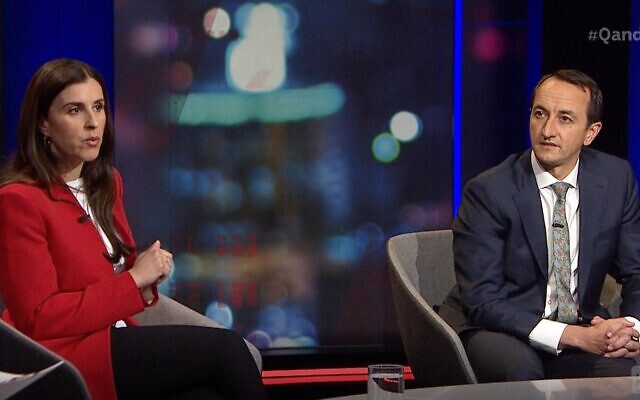Did ABC apologise? ABC and ECAJ clash
When The AJN asked ABC what had been misrepresented, a spokesperson insisted managing director David Anderson had not apologised for any of the coverage.
THE ABC has denied apologising to the Executive Council of Australian Jewry (ECAJ) over its recent coverage of the Israel-Hamas conflict, labelling ECAJ’s recent statement on its meeting with the broadcaster “deeply disappointing”.
As The AJN reported last week, ECAJ had claimed that managing director David Anderson “readily acknowledged … ‘many errors’ for which he apologised” and was “keen to explore specific constructive steps to prevent a recurrence of the problems we raised and improve the quality of the ABC’s news coverage”.
However, the ABC subsequently stated its “position has been misrepresented” and stressed that in reality Anderson had acknowledged “a small number of minor errors, mostly around the nuance in the use of contested terms”.
When The AJN asked ABC what had been misrepresented, a spokesperson insisted Anderson had not apologised for any of the coverage.
This week, ECAJ president Jillian Segal and co-CEO Peter Wertheim doubled down on their version of what had transpired, telling The AJN, “There is clearly a difference of interpretation concerning certain statements that were made during the discussion, which was conducted in good faith by all parties.
“We stand by the accuracy of our report,” they stated, adding, “We remain focused on continuing our dialogue with the organisation on the substantive issues which we discussed, and reiterate our willingness to work with the ABC to proceed with the constructive steps forward that were discussed at the meeting.”
Meanwhile, the ABC has also responded to multiple complaints about the lack of balance in the Q&A episode “Trauma and Truth Telling”, which focused on the conflict.
Concerns were raised over the predominantly pro-Palestinian slant of the panel, with no Jewish or Israeli voices represented.
Stating complaints had been investigated by Audience and Consumer Affairs, the ABC insisted, “We are satisfied that a range of principal relevant perspectives were presented on the issue, and that no one view was unduly favoured over any other in the broadcast.”
Noting the panel included former ambassador to Israel Dave Sharma who “provided an informed perspective on Israel’s actions and decisions”, it also stated that pro-Palestinian advocate Randa Abdel-Fattah’s view was “strongly contested”, and that “the opposing view justifying Israel’s actions was prominently presented”.
The ABC went on to state that Israeli ambassador Jonathan Peled had been invited to participate, but was unable to travel to Sydney, while ECAJ co-CEO Alex Ryvchin had declined an invitation to be an “expert audience member” who could contribute by “asking a question and expressing his perspective”.
Ryvchin, however told The AJN, “I was initially invited to ‘participate in the program’, which I interpreted to mean on equal terms as a panel member,” – an offer he accepted, before it was clarified that he would just be in the audience.
The Israeli embassy, meanwhile, confirmed to The AJN that the ambassador, likewise, had only been invited to participate as an audience member.
“The decision to exclude Jewish-Australian perspectives from the panel has caused great distress,” Ryvchin said.
AIJAC executive director Colin Rubenstein told The AJN that asking the pair to participate simply as audience members “makes a mockery of the network’s obligations under the ABC’s Code of Practice”.
He added that the broadcaster’s assessment of the episode was “laughable”, adding that it “yet again demonstrates something is clearly deeply wrong at the ABC, and its complaints procedure at the very least is in need of urgent reform”.
The sentiment was echoed by Zionist Federation of Australia president Jeremy Leibler. Slamming the ABC’s “indifferent responses to the legitimate concerns raised by the Jewish community” and its “systemic bias against Israel”, he said, “After seeing the ABC’s cut-and-paste responses to the complaints made about its coverage, I am not confident that anything other than a truly independent body that ensures the ABC remains true to its editorial policies will be effective. It is time for the government to establish such a body.”
The call comes as Senator for South Australia Alex Antic launched a petition calling on the government to appoint “a public broadcasting ombudsman to monitor the operations of the ABC”.
Antic, who just last month dubbed the broadcaster “institutionally antisemitic” and “consistently anti-Israel” said, “The ABC was once an institution of national unity, trusted to provide Australians with accurate and impartial news. But it has developed into a left-wing collective that’s out of touch with mainstream Australia.”
To sign the petition, visit mailchi.mp/alexantic/abc-petition.


comments